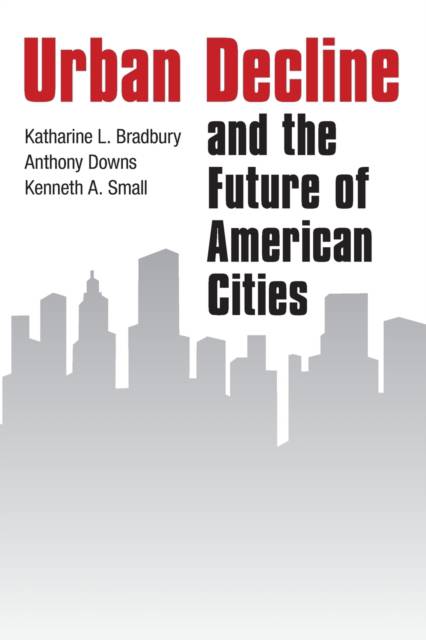
Door een staking bij bpost kan je online bestelling op dit moment iets langer onderweg zijn dan voorzien. Dringend iets nodig? Onze winkels ontvangen jou met open armen!
- Afhalen na 1 uur in een winkel met voorraad
- Gratis thuislevering in België vanaf € 30
- Ruim aanbod met 7 miljoen producten
Door een staking bij bpost kan je online bestelling op dit moment iets langer onderweg zijn dan voorzien. Dringend iets nodig? Onze winkels ontvangen jou met open armen!
- Afhalen na 1 uur in een winkel met voorraad
- Gratis thuislevering in België vanaf € 30
- Ruim aanbod met 7 miljoen producten
Zoeken
Urban Decline and the Future of American Cities
Katharine L Bradbury, Anthony Downs, Kenneth A Small
Paperback | Engels
€ 33,45
+ 66 punten
Omschrijving
During the past two decades, most large American cities have lost population, yet some have continued to grow. Does this trend foreshadow the "death" of our largest cities? Or is urban decline a temporary phenomenon likely to be reversed by high energy costs? This ambitious book tackles these questions by analyzing the nature and extent of urban decline and growth of large U.S. cities. It includes and integrates five substudies. The first examines urban decline and some of its long-run causes, and whether cities that are losing population are performing their economic and social functions less effectively. The second substudy is a multivariate analysis of factors associated with the growth and decline of 121 large U.S. cities and their metropolitan areas. Although its causes vary, urban decline appears closely related to processes that have both upgraded individual households and generated serious problems for city governments and poor neighborhoods. A third substudy shows that neighborhood decline is part of a systematic process related to the influx of poor households into metropolitan areas. Another substudy simulates five antidecline strategies in a single metropolitan area, that of Cleveland, Ohio, and finds that severe decline (occurring in about one-fourth of large U.S. cities) could be slowed, though not stopped by vigorous policies. From the last substudy it emerges that, even if gasoline prices rose to over $2 a gallon, resulting adjustments by commuters and firms would produce little net centralization of future urban development--though many older neighborhoods would probably be rehabilitated. The book concludes that further losses of population and jobs in most severely declining cities are unavoidable in the near future. Even Southern and Western cities, now growing fast, will find their rate of growth slowing as further annexation of surrounding territory is limited. The book ends with two chapters discussing policies designed both to help declining population and job losses and to minimize such loses in other cities.
Specificaties
Betrokkenen
- Auteur(s):
- Uitgeverij:
Inhoud
- Aantal bladzijden:
- 324
- Taal:
- Engels
Eigenschappen
- Productcode (EAN):
- 9780815710530
- Verschijningsdatum:
- 1/08/1982
- Uitvoering:
- Paperback
- Formaat:
- Trade paperback (VS)
- Afmetingen:
- 152 mm x 229 mm
- Gewicht:
- 476 g

Alleen bij Standaard Boekhandel
+ 66 punten op je klantenkaart van Standaard Boekhandel
Beoordelingen
We publiceren alleen reviews die voldoen aan de voorwaarden voor reviews. Bekijk onze voorwaarden voor reviews.











